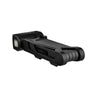Built to withstand terrains too demanding for regular bicycles, fat tyre bikes initially emerged in Alaska during the 1980s as a means to traverse soft and unstable snow.
These bikes, which were specifically designed for snow-covered regions, also proved to be capable of exploring previously inaccessible landscapes: desert, bogs, mud, pavement, mountain trails, and other loose terrain.
Coined by Alaskan frame builder Mark Gronewald, the name “fat tyre” now describes an entire category of off-road bicycles with oversized tyres and superior traction. What was originally meant for winter riding evolved into an efficient year-round bicycle that caught the eye of cyclists and adventurers worldwide.
But it was the invention of electric bicycles that catapulted fat-tyre bikes into mainstream popularity. The addition of the motor made the bulky fat-tyre bicycles easier to ride and manoeuvre, making these bicycles more accessible to a wider range of people
What are Fat-Tyre E-Bikes?
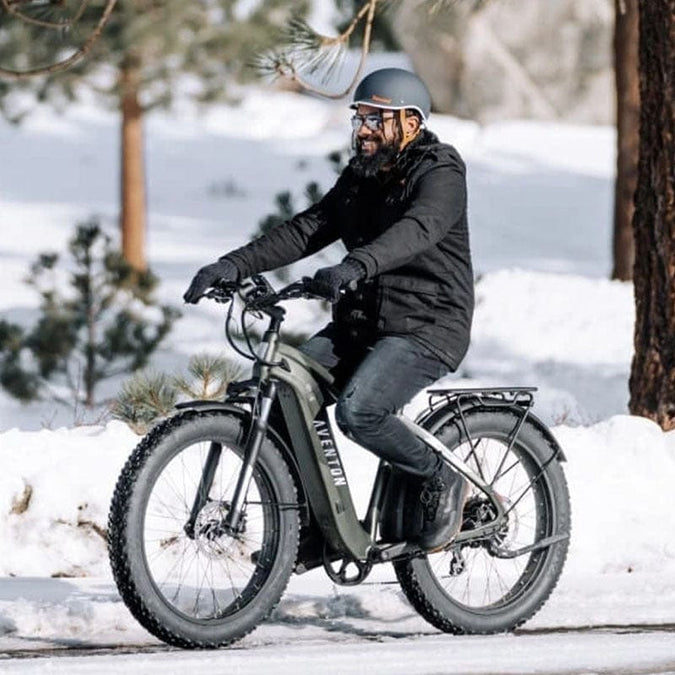
Fat-tyre e-bikes are electric bikes that feature tyres that are wider than the ones on your regular bike. Usually, the tyres on a fat-tyre bike are 3-4 inches in width, which could be 2-4 times the size of standard tyres (1-2.5 inches on average).
These oversized tyres lend fat-tyre e-bikes not only their distinct look but also greater stability and enhanced grip.
Who Would Buy A Fat Tyre E-Bike?
Fat-tyre bikes, despite their rugged appearance and powerful capabilities, appeal to riders of different skills and interests. That said, here are all the types of riders who enjoy riding fat tyre electric bikes:
1. Adventurers
The origin of fat-tyre bikes was rooted in the necessity of navigating challenging terrain, so it makes natural sense to place adventurers first in our list. Outdoorsy folks like campers, hunters, and bikepackers are drawn to the excitement of using their fat-tyre bikes in forests and on rocky mountain paths
Those seeking adrenaline-pumping rides will love using a fat-tyre electric bike to venture into off-road trails, zoom over bike trails, and explore almost every type of terrain imaginable.
2. Commuters
But aside from being an exceptional outdoor buddy, a fat-tyre electric bicycle also serves as a practical replacement for your car for daily commutes. Commuters in urban areas, especially those whose routes involve rough pavement and high curbs, will appreciate the smooth and stable ride offered by a fat-tyre e-bike.
3. Eco-Conscious Consumers
While there are several types of electric vehicles available for the ecologically conscious consumer, many consider fat-tyre electric bikes to be more versatile and adaptable than regular electric bikes and electric scooters.
4. Recreational Riders
Fat-tyre electric bikes are also an excellent choice for recreational riders who ride to savour scenic views. Women and younger riders, in particular, will appreciate the stability fat tyres offer, allowing them to smoothly cruise along the beach and relish beautiful routes through the woods, national park trails, and more.
5. Fitness Enthusiasts
Individuals who seek a more active lifestyle can also use fat-tyre electric bikes to exercise. Cycling, even with motorised assistance, provides a great opportunity to stay physically fit while enjoying the outdoors. To elevate the intensity of your workout and reach your fitness goals, use your bike to pedal across challenging trails and steeper inclines.
6. Riders with Limitations
Finally, the stability of electric bikes with fat tyres can make cycling accessible to senior riders and those with physical limitations. The pedal assist feature provides extra support for older individuals, while the oversized tyres offer a cushioning effect that helps reduce the impact of bumps and vibrations on the joints.
Which Type of Fat-Tyre E-Bike is For You?
Much like regular electric bicycles, there are also different types of fat-tyre electric bikes, each designed for specific purposes and riding styles. Here are some of the most popular types to choose from:
Fat-Tyre Electric Mountain Bikes
As the name suggests, a fat-tyre electric mountain bike is basically an electric mountain bike with oversized tyres.
Specifically tailored for intense off-roading and tackling rugged mountain bike trails, an electric fat tyre mountain bike is equipped with sturdy frames and a suspension fork that absorbs shock from the rocky terrain.
Folding Fat Tyre Electric Bikes
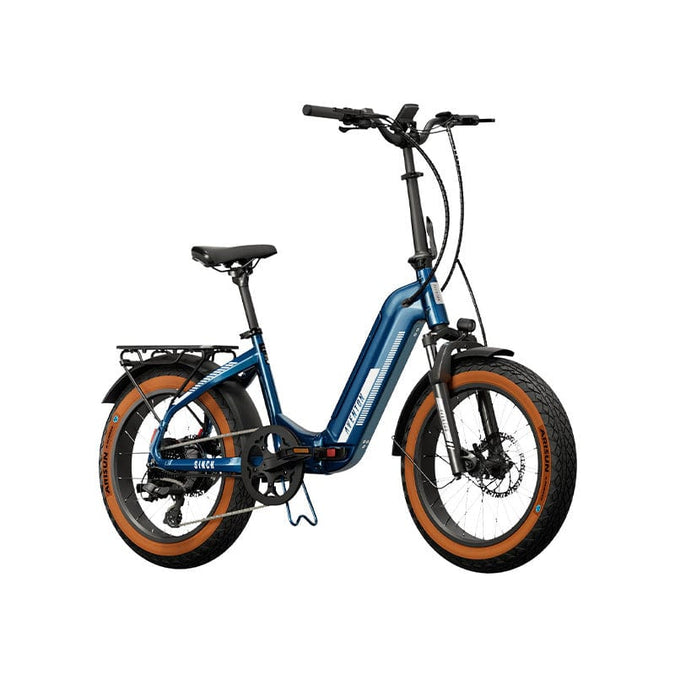
Characterised by a smaller frame and a folding mechanism, folding fat-tyre electric bikes are ideal for commuters or those who value portability. City dwellers, in particular, will find these collapsible bikes highly convenient as they wouldn’t have to worry about parking space.
Fat tyre folding electric bikes are also a great option for avid campers as well as individuals who have embraced a nomadic lifestyle because these compact bikes take up minimal space in mobile homes or RVs.
All-Rounder Fat Tyre Electric Bike
While fat-tyre electric mountain bikes are built for rugged terrain, all-rounders are more versatile and are ideal for navigating paved roads, light off-road trails, and the urban environment in general.
They may be a bit smaller than fat-tyre e-mountain bikes and may come with commuter-friendly accessories like lights and storage racks. They may or may not be equipped with a suspension.
Our Top Recommendations:
Electric Kicks carries Aventon and C3Strom fat-tyre electric bikes, brands that are known to carry the best fat tyre electric bikes in Australia. Here are our top recommendations:
Aventon Aventure.2
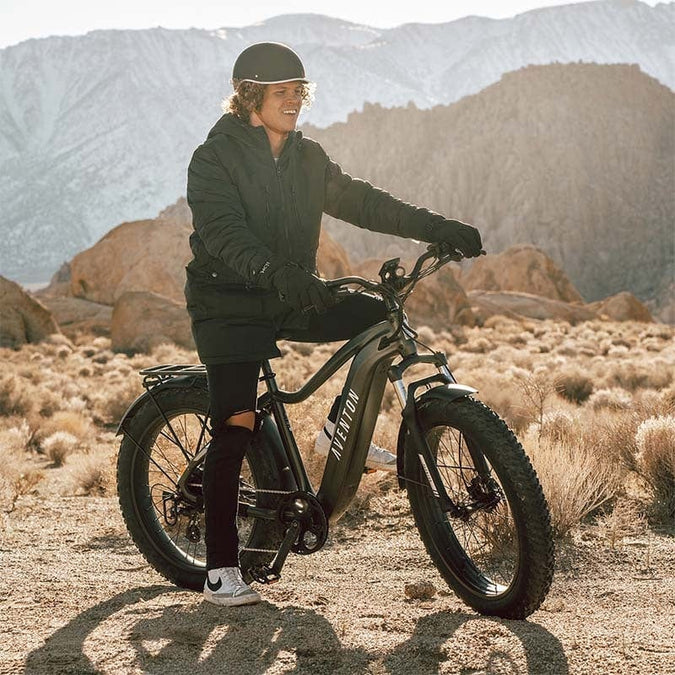
The Aventon Aventure.2 is a versatile all-rounder fat-tyre electric bicycle that rides effortlessly over difficult and loose terrain. With its excellent range, enhanced brakes, torque sensor, and indicators, you can count on using the Aventure.2 in any riding condition.
We have two versions available: the Aventon Aventure.2 Step Over and Aventon Aventure.2 Step Through. The step-over, which typically appeals to riders looking for a sportier and more aggressive look, is favoured by those who require speedy and more efficient pedalling.
On the other hand, the step-through is the ideal choice for riders who don’t prefer lifting their leg over the bicycle’s frame. Riders may choose the step-through due to mobility limitations, restrictive clothing, or simply a personal preference for a more casual look.
Let’s compare how Aventon Aventure.2 fares against its popular competitors:
|
Aventon Aventure.2 |
Eunorau FAT-AWD |
AMPD Bros Chubbie Electric Beach Cruiser Bike |
DiroDi Vivo Cruiser All Terrain Fat Tyre E-Bike |
|
|
Top Speed |
45 kph |
32 kph |
25 kph |
Not indicated |
|
Max Range |
96 km |
56 km |
50 km |
90 km |
|
Motor |
750W |
750W |
750W |
750W |
|
Battery |
48V 15Ah 720Wh removable lithium-ion |
48V 15.6Ah 750Wh removable lithium-ion |
48V 14Ah 672Wh removable lithium-ion |
52V 15Ah 630Wh removable |
|
Charging Time |
4-5 hours |
6-7 hours |
6-8 hours |
Not indicated |
|
Weight |
35 kg |
35.5 kg |
38 kg |
30.6 kg |
|
Rider Weight |
181 kg |
170 kg |
120 kg |
Not indicated |
|
Brakes |
Hydraulic Disc |
Mechanical disc |
Hydraulic disc |
Mechanical disc |
|
Pedal Assist |
4 levels |
5 levels |
3 levels |
7 levels |
While the Eunorau FAT-AWD and the DiroDi Vivo Cruiser All Terrain bicycles offer more pedal assist levels, the Aventure.2 surpasses them in several key areas, namely top speed, maximum range, charging time, and rider weight capacity. In addition, the Aventure.2’s hydraulic brakes ensure maximum stopping power.
All these make the Aventure.2 a formidable yet practical choice for riders who prioritise performance and speed.
Aventon Aventure
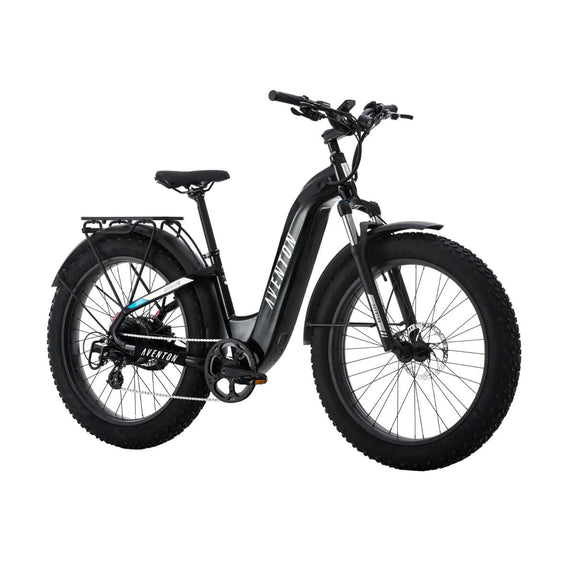
Available at a very reasonable price point, the Aventon Aventure is a bike that is built to last. Despite its affordable price tag, it does not compromise on performance and comes equipped with premium components.
You won’t see many plastic parts and cheap fenders on this bike; thus, you wouldn’t hear any rattling when you ride. Users have praised the Aventure for its ability to offer stable and wobble-free rides, a testament to Aventon bikes’ top-notch construction.
Similar to the Aventure.2, we have two versions of the Aventure available: the Aventon Aventure Step-Over and the Aventon Aventure Step-Through.
Let's explore the Aventure's features in comparison to its competitors:
|
Aventon Aventure |
Eunorau FAT-HD |
Eunorau FAT-AWD |
Leitner Electric Fat Bike |
Matrix GTR |
|
|
Top Speed |
45 kph |
45 kph |
32 kph |
32 kph |
35 kph |
|
Max Range |
72 km |
64 km |
56 km |
65 km |
60 km |
|
Motor |
750W |
1000W |
750W |
750W |
500W |
|
Battery |
48V 15Ah 720Wh removable lithium-ion |
48V 15.6Ah 750Wh removable lithium-ion |
48V 15.6Ah 750Wh removable lithium-ion |
48V 10Ah 480Wh removable lithium-ion |
48V 10Ah 480 Wh |
|
Charging Time |
4-5 hours |
4-6 hours |
6-7 hours |
5-6 hours |
Not indicated |
|
Weight |
33 kg |
35.7 kg |
35.5 kg |
28.9 kg |
Not indicated |
|
Rider Weight |
181 kg |
170 kg |
170 kg |
120 kg |
120 kg |
|
Brakes |
Hydraulic disc |
Hydraulic disc |
Mechanical disc |
Mechanical disc |
Mechanical disc |
|
Pedal Assist |
5 levels |
5 levels |
5 levels |
5 levels |
Not indicated |
Even with this group’s nearly identical specs – pedal assist levels, motor power output, and battery voltage – the Aventon Aventure manages to stand out as a serious competitor.
The inclusion of powerful hydraulic brakes sets it apart, ensuring secure stopping even on challenging terrains. And the Aventon not only promises shorter charging time but also boasts impressive top speeds, better maximum range, and a rider weight capacity that is significantly higher than the others.
Aventon Sinch.2
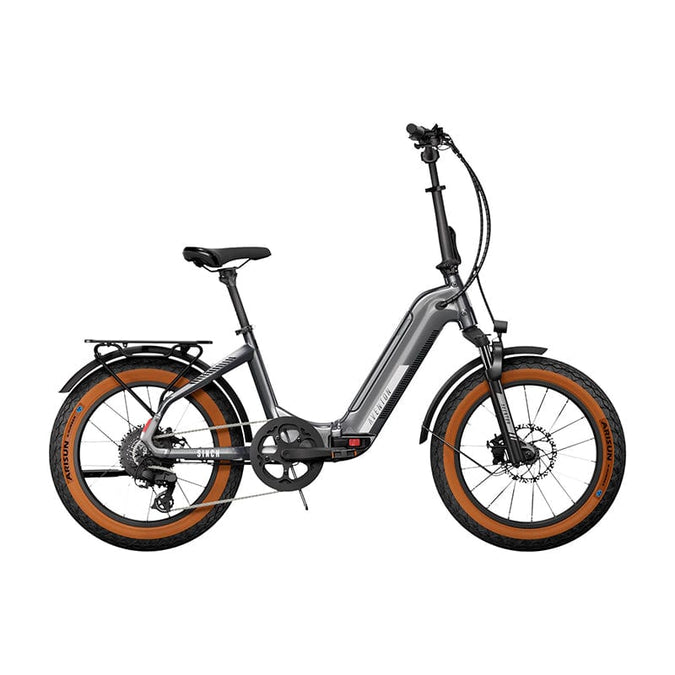
If you are in the market for a folding fat-tyre electric bike, the Aventon Sinch.2 should be on your radar. Combining performance and convenience in one compact package, the Sinch.2 is more powerful than your average electric bike yet more portable than other types of fat-tyre electric bikes.
The Aventon Sinch.2 has a simple step-through frame, complemented by a secure and stable locking mechanism. Unlike other folding bikes, you wouldn’t hear any bothersome rattling and clicking noises with the Sinch.2, making sure that you enjoy quiet and comfortable rides.
Let's compare the Aventon Sinch.2 to other folding fat-tyre electric bikes:
|
Aventon Sinch.2 |
Earth Ant eBike |
ET-CYCLE F720 Folding E-Bike |
Kristall RX20 MAX |
|
|
Top Speed |
32 kph |
27 kph |
32 kph |
45 kph |
|
Max Range |
88 km |
55 km |
96 km |
80 km |
|
Motor |
500W |
250W |
500W |
750W |
|
Battery |
48V 14Ah 672 Wh removable lithium-ion |
36V 17Ah 600 Wh removable lithium-ion |
48V 15Ah 720 Wh removable lithium-ion |
48V 17Ah 816 Wah removable lithium-ion |
|
Charging Time |
4-5 hours |
2-8 hours |
5-6 hours |
Not indicated |
|
Weight |
30 kg |
26 kg |
34 kg |
36 kg |
|
Rider Weight |
136 kg |
Not indicated |
Not indicated |
150 kg |
|
Brakes |
Mechanical disc |
Hydraulic disc |
Mechanical disc |
Hydraulic disc |
|
Pedal Assist |
5 levels |
Not indicated |
Not indicated |
Not indicated |
Despite having lower motor power output and battery capacity than some of its competitors, the Aventon Sinch.2 manages to deliver a commendable performance, striking a fine balance between offering sufficient rider weight capacity and achieving impressive top speeds and maximum range.
These attributes demonstrate the overall efficiency and versatility of the Sinch.2.
C3Strom Astro Pro

Appearing to have come straight from a sci-fi movie, the C3Strom Astro Pro is a high-powered fat-tyre electric bike that combines elements of a mountain bike and a motorcycle. The result is a crossover that appeals to every riding enthusiast.
But the Astro Pro doesn’t just look striking. It’s also highly functional, with a powerful motor that pushes the bicycle to achieve instant acceleration and impressive top speeds. A class of its own, the Astro Pro is a futuristic and versatile all-rounder that will take you from city streets to adventurous off-road trails.
Let’s compare it against two well-known competitors:
|
C3Strom Astro Pro |
AMPD Bros Ace-X Plus+ |
DiroDi Rover Plus Fat Tyre E-Bike |
|
|
Top Speed |
50 kph |
25 kph |
25 kph |
|
Max Range |
125 km |
70 km |
85 km |
|
Motor |
750W |
500W |
750W |
|
Battery |
52V 20Ah 1040 Wh removable lithium-ion |
48V 14Ah 672Wh removable lithium-ion |
48V 17.4Ah 835Ah removable lithium-ion |
|
Charging Time |
4-5 hours |
6-8 hours |
Not indicated |
|
Weight |
43 kg |
38 kg |
31 kg |
|
Rider Weight |
150 kg |
150 kg |
Not indicated |
|
Brakes |
Hydraulic disc |
Mechanical disc |
Hydraulic disc |
|
Pedal Assist |
5 levels |
Not indicated |
6 levels |
The C3Strom Astro Pro stands out from the competition with its remarkable top speed and exceptional maximum range.
And despite its high-capacity battery, it requires a reasonable charging time that’s akin to devices of lower capabilities. In addition, while it accommodates the same rider weight as the Ace-X Plus+, its hydraulic brakes deliver a more robust stopping power.
The Pros and Cons of Getting a Fat-Tyre E-Bike
Getting a fat-tyre electric bike is a decision that requires careful consideration. Thus, before making your purchase, it is important to weigh the advantages and disadvantages of getting one.
PROS
1. Shock Absorption
Since the fat-tyre e-bike’s oversized tyres cover more surface area than standard bike tyres, it is capable of absorbing more impact and shock. The result is a more comfortable ride that is free from unwanted bumps and vibrations.
2. Grip and Traction
Similarly, there is a broader area of contact between the tyres and the ground, resulting in even weight distribution and better grip and control. If you need to navigate loose or wet terrain, using a fat-tyre electric bike will ensure a more secure ride without risk of slipping or skidding.
3. Stability
By creating a stable base, the oversized tyres of the fat-tyre e-bike definitely contribute to the bicycle’s stability. But it’s not just the tires. The entire frame of the e-bike is designed with stability in mind. Its wide and sturdy construction establishes a stable and solid platform, giving users a higher level of assurance and confidence.
4. Versatility
As alluded to above, fat-tyre electric bikes demonstrate exceptional versatility and have proven to be highly efficient in navigating all sorts of trails and terrain, from sand and snow to gravel and tarmac. If you are a rider who seeks diverse riding experiences, a fat-tyre bike can open up a world of possibilities.
CONS
1. Upfront Cost
However, because of their construction, particularly the bigger wheels and the wider frame, fat-tyre electric bikes can be pricier than your standard electric bike.
2. Limited Speed
Because fat-tyre bikes are bulkier and heavier than most electric bikes, they are not as swift on flat terrain as their lightweight counterparts. If speed is important to you, check out the Aventon Aventure range.
3. Maintenance
Compared to regular electric bikes, fat-tyre e-bikes may require more frequent maintenance. To maintain your bike’s efficiency, you will need to clean the tyres more often, perform regular checks on tyre pressure, and have the electric components regularly inspected.
Making the Decision
Indeed, the choice to get a fat-tyre electric bike does involve trade-offs, and the decision will ultimately depend on your priorities. Do you require a speedy and lightweight bicycle, or do you need a multi-purpose bike that can handle any riding situation?
Like anything else, getting a fat-tyre bike may come with a few disadvantages, but if your priority is versatile and efficient riding, you will find that the benefits far outweigh these drawbacks.
What You Should Look For in a Fat-Tyre E-Bike
If you have made up your mind about getting a fat tyre electric bike, read on to learn more about the factors you must consider before making your purchase.
Motor Type
The motor propels your electric bike and plays a crucial role in its overall performance.
Electric bike motors are categorised into mid-drive, front-hub and rear-hub. Front and rear hub motors are positioned in the centre of either the front or rear tyre, mid-hub motors are located on the bike’s bottom bracket.
Aside from the placement, each type of motor differs in cost and power produced.
1. Mid-Driver Motor
Usually more expensive than other variations, electric bikes with mid-drive motors are known to produce the highest amount of power output, which leads to enhanced performance and climbing capabilities.
Also, the motor’s central placement equates to a low centre of gravity, which results in better equilibrium and weight distribution.
In general, mid-drive motors can be found on hunting fat-tyre electric bikes as well as some mountain electric bikes.
2. Front and Rear Hub Motors
Less expensive than mid-drive motors, electric bikes with front and rear hub motors are also more common.
Front hub motors, which are usually found in folding e-bikes, power the front wheel and pull the bicycle forward. On the other hand, rear rub motors can be found across all types of e-bikes and work by pushing the bike forward. The way these motors work results in subtle differences in performance and climbing hills.
While mid-drive motors perform exceptionally well on off-road trails, you can opt for a front or rear hub drive fat-tyre electric bicycle if your purpose is mostly for urban commuting. However, rear hub motors tend to offer superior traction, which comes in handy if your commute involves going uphill.
Power Output
Expressed in wattage or in Watts (W), the electric bike’s motor power represents the amount of electric energy generated by the motor to accelerate, ascend, and provide assisted pedalling.
For everyday commuting or casual riding, a bike with a 500W motor would suffice. However, for off-roading and adventures that call for more rugged performance, you need to get a fat-tyre electric bike with a power output of at least 750W. A higher power output is necessary to tackle challenging terrains with ease and confidence.
Your weight is also something you need to consider when choosing an electric bike. Heavier riders will require a bicycle with a higher power output to provide sufficient support and assistance while riding.
Battery and Range
The battery, which powers the electric motor, is one of your e-bike’s most important components. Here are the factors you need to consider:
1. Type
There are a few types of batteries that are used in fat-tyre electric bikes: lithium-ion, lithium-polymer, and nickel-metal hydride. Of these, choose an electric bike with a lithium-ion battery. They are the most reliable, providing superior performance with higher energy density and a longer lifespan.
2. Capacity
Measured in watt-hours (Wh), capacity signifies how much energy the battery is capable of storing. This directly influences how much range your electric bike can cover on a single charge – the higher the capacity, the longer the range.
Assess your riding needs to determine how much range you need on your electric bike. Typically, our fat-tyre electric bicycles can cover 80 to 100 km on a single charge. In real life, however, the range may be affected by other variables like rider weight, terrain, incline, and weather conditions.
3. Charging Time
Also factor in charging time when choosing your electric bicycle. On average, high-powered electric bikes will take longer to charge than mid- or low-powered vehicles. However, our Aventon fat tyre electric bikes are an exception, only requiring 4-5 hours to fully charge.
Frame Size
Also consider the size of your fat-tyre electric bike, ensuring that it suits your body type and height just fine to prevent improper posture and potential injuries.
Fat tyre electric bikes are available in three sizes: small, medium, and large. To determine which one fits you, you need to measure your height and your inseam (the length from your crotch to the floor). Compare your measurements with the manufacturer’s bike size chart to identify the right size for you.
Alternatively, you can also choose to roughly estimate your size:
- Small - fits riders between 5' to 5'6"
- Medium - suits for riders between 5'7" and 5'11"
- Large - works best for riders between 6' and 6'4".
Brakes
Next, assess the type of brakes that you need in your fat-tyre electric bicycle. Do you go for mechanical or hydraulic?
Mechanical brakes utilise cables and mechanical levers to apply pressure and stop the rotation of the bicycle wheel, while hydraulic brakes use fluid pressure to achieve the same.
Due to its simple mechanism, mechanical brakes are more affordable and easy to maintain. While they may have slightly less stopping power compared to hydraulic brakes, they are still highly dependable and well-suited for most cycling needs.
But, if your riding needs are more rigorous and demanding, we advise choosing a fat-tyre electric bicycle equipped with hydraulic brakes. Hydraulic brakes offer superior stopping power to ensure safe rides in various conditions.
Suspension
The latest electric fat tyre bikes are typically equipped with a suspension. Some feature both front and rear suspension, while most are fitted with front suspension.
For commuting and light riding on urban roads, a suspension may not really be necessary, as the oversized tyres already provide sufficient cushioning and shock absorption.
However, a decent suspension is crucial if you’re looking to ride on rough terrain. For activities like hunting, trekking, camping, and other expeditions, a robust suspension is something your fat-tyre electric bicycle must have.
Wrapping Up
Fat-tyre electric bikes offer an extraordinary way to navigate the city and explore the great outdoors.
Combining the benefits of electric pedal assist and the enhanced stability of oversized tyres, these bikes cater to a wide range of riders: regular commuters, daring adventurers, casual riders, and individuals with certain limitations.
There is no match for the grip and traction an electric fat tyre bike can provide. With a variety of options available, from mountain bikes to all-rounders, there is a perfect fat-tyre electric bicycle for every rider.
Are you ready to purchase a fat tyre electric bike in Australia?
Whether you’re in need of a reliable camping, hunting, or off-roading companion or are simply looking for a more versatile commuter ride, our picks from Aventon and C3Strom have you covered.
At Electric Kicks, we offer a wide range of options to complement every lifestyle, and there is no doubt in our minds that we can match you with your perfect ride. Explore our selection today, and embark on your next adventure with a trusty fat-tyre electric bike!


